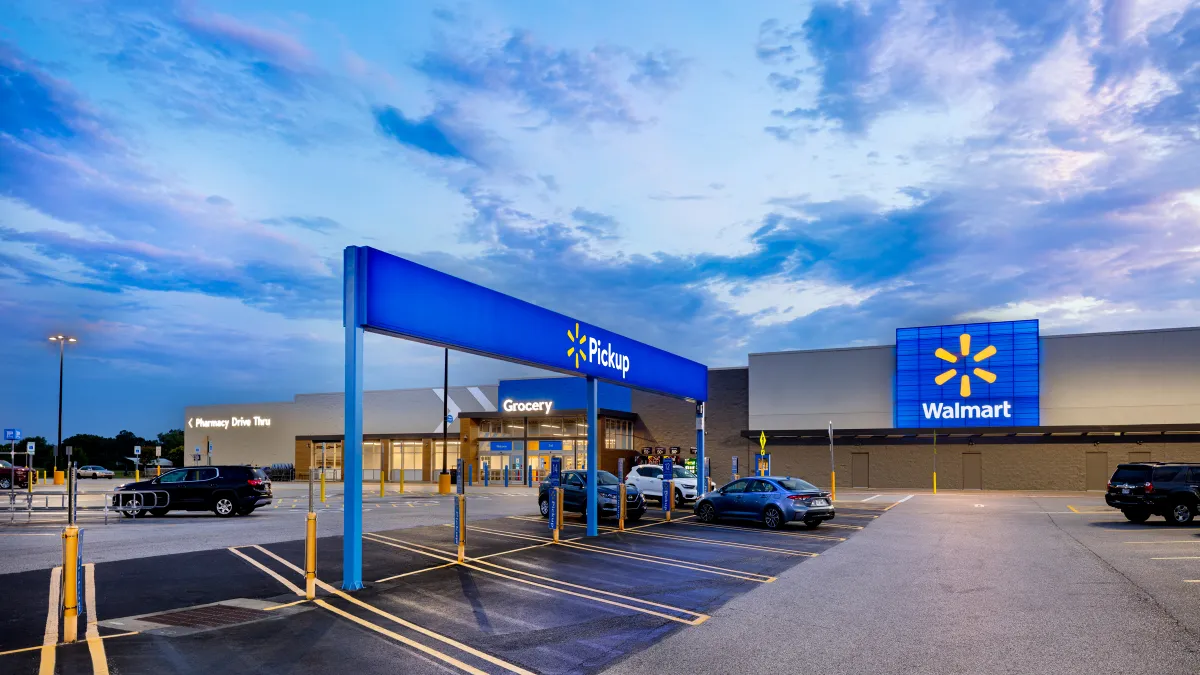Dive Brief:
- Walmart is seeking a leader for digital and cryptocurrency products, according to a recent job post.
- In the post, the company said it is looking for someone to drive digital currency strategy at the retailer, including by identifying customer needs as well as "Crypto related investment and partnerships."
- The job would be housed in Walmart's Bentonville, Arkansas, headquarters.
Dive Insight:
From Prime Day to pharmaceutical discounts, Walmart and Amazon are often in sync as the rivals dance around each other and compete for dominance over the unknowable future of retail.
As noted by MarketWatch, which previously reported on Walmart's job post for a crypto lead, the retailer follows Amazon in seeking a candidate for an almost identical role.
In its post, Amazon said it was looking for someone to "leverage your domain expertise in Blockchain, Distributed Ledger, Central Bank Digital Currencies and Cryptocurrency to develop the case for the capabilities which should be developed, drive overall vision and product strategy, and gain leadership buy-in and investment for new capabilities."
Amazon's post led to an 11% upswing in Bitcoin's value, according to MarketWatch. Walmart's post led to a more modest 3% bump in Bitcoin's value and 16% surge in dogecoin's value.
The cryptocurrency markets are prone to such swings. Over the past decade, investors have piled into and fled cryptocurrencies with tremendous energy. Most consumers, on the other hand, have largely ignored the alphabet soup of currencies as payment forms. According to Statista, just 6% of survey respondents in the U.S. said they used or owned cryptocurrency in 2020.
Because the value of cryptocurrencies can swing so quickly and to such extremes — just the sort of thing that central banks try to prevent in government-backed currencies — it can be risky for consumers to use the currencies and merchants to accept them. The computer processes that support and generate the currencies happen to also be extremely energy-intensive and major contributors to carbon emissions.
Seven years ago, Overstock.com became the first online retailer to accept bitcoin as a payment. The company's then-CEO Patrick Byrne believed that accepting bitcoin payments could "ultimately boost the company's bottom line," according to Wired magazine. Today, the company warns investors that its decision to accept bitcoin adds "exchange risk and additional tax and regulatory requirements" to its business.
Byrne so believed in the potential of cryptocurrencies and the blockchain technology underlying them that Overstock invested millions in trying to transform itself into a leader in blockchain applications and investments. It didn't work out as planned, though. The company lost millions of dollars through the investments and lost focus on its retail business. It wasn't until a new CEO took over, turned over management of its blockchain portfolio to an outsider and refocused the company around profitably selling furniture online that Overstock returned to the black.
Overstock's case might be extreme, but it is a reminder of how speculative the future of blockchain and other new technologies can be. Whether Walmart and Amazon are making smart hedges on the future or wasting time and money depends on both the resources they ultimately devote to digital currencies, as well as what becomes of the currencies themselves and the technologies behind them.















